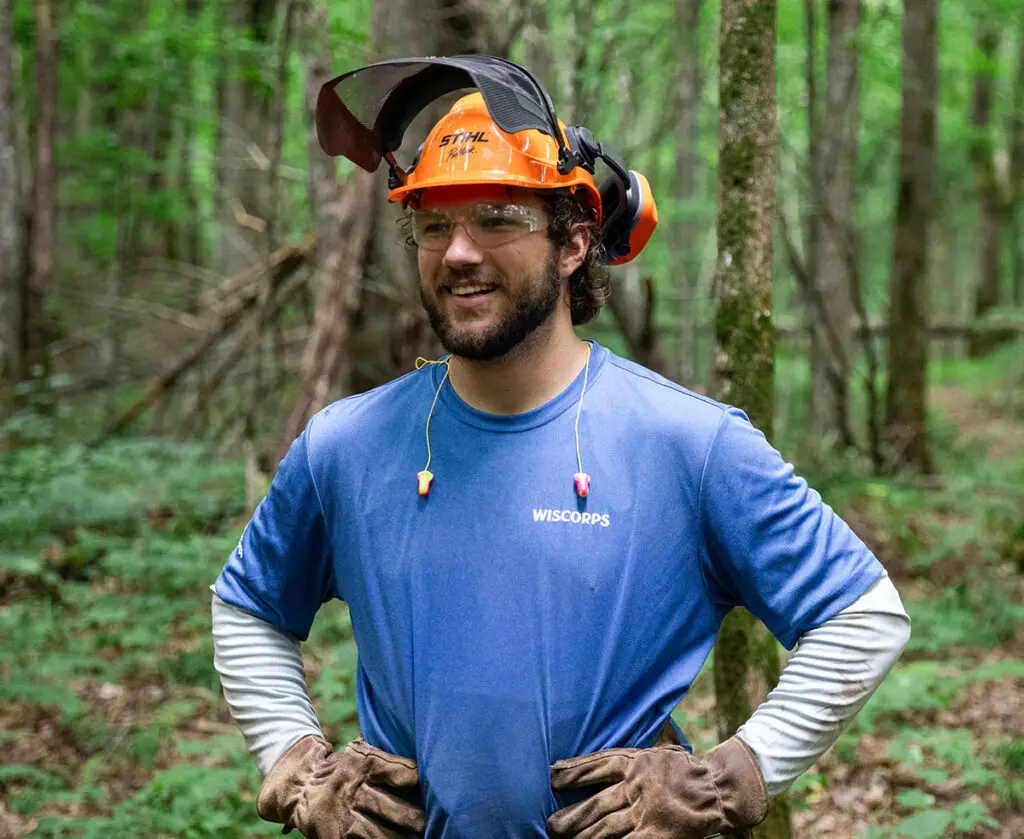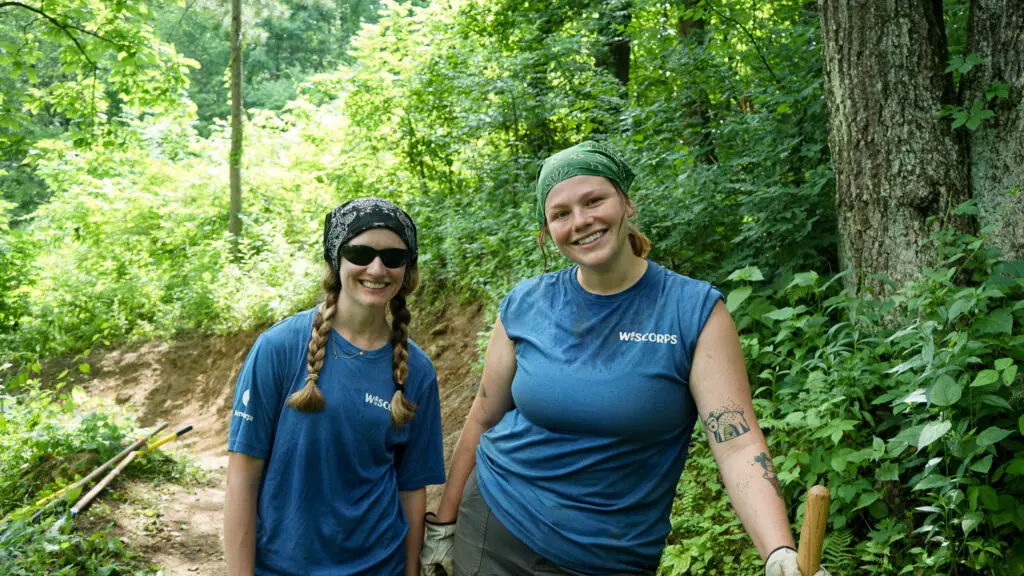Conservation Crews
Our crews serve together for 3+ months in the Upper Midwest
under the expert guidance of WisCorps’ Staff.
Learn more about joining a crew at our next
informational webinar.
Next meeting:
August 29
4pm-5pm CT
Learn more about joining a crew at our next
informational webinar.
Next meeting:
August 29
4pm-5pm CT
Crew Programs
Join the Wisconsin Conservation Corps to work on hands-on conservation projects across the Upper Midwest.
Crews build trails, manage habitats, and complete carpentry projects on public land. Participants live, work, and travel together and have the opportunity to network with professionals and serve local communities during their AmeriCorps service term. The program runs in the summer (May-August) and fall (September-November), and you can choose to participate in one or both terms.
Crew Leaders
Crew Leaders oversee and motivate members to complete outdoor conservation projects.
They work directly with project partners, ensure crew safety, educate members on conservation operations, and maintain communication. They also drive WisCorps fleet vehicles and promote awareness through community engagement.

Crew Members
Crew Members work as a team to complete restoration projects across Wisconsin and the Upper Midwest. They promote community service and environmental awareness on and off the project site.

2025 Field Season
Leader Training
4/28/2025 – 5/25/2025
Summer Season
5/26/2025 – 8/15/2025
Fall Season
9/15/2025 – 11/14/2025
Learn more about joining a crew at our next
informational webinar.
Next meeting:
August 29
4pm-5pm CT
Frequently Asked Questions
2026 Leader Commitment?
Summer Session: 4/21 – 8/19/26 (18 weeks) – 1200-Hour Service Term
Leader Training: 4/21 – 5/17
Crew Training: 5/18 – 5/24
Summer Projects: 5/25 – 8/12
Member Graduation: 8/13 – 8/15
Leader Maintenance: 8/16 – 8/19
3-Week Mid-Season Break: 8/20 – 9/7/26
Fall Session: 9/8 – 11/14/26 (10 weeks) – 900-Hour Service Term
Crew Training: 9/8 – 9/12
Fall Projects: 9/13 – 11/11
Crew Graduation: 11/12 – 11/14
2026 Summer Member Commitment?
Member Training – 5/18 – 5/24/2026 (La Crosse, WI)
Summer Session – 05/25- 08/12/2026 (Across the Upper Midwest)
Member Graduation – 8/13 – 8/15/2026 (La Crosse, WI)
2026 Fall Member Commitment?
Fall Training – 9/8 – 9/12/2026 (La Crosse, WI)
Fall Session – 9/13 – 11/11/2026 (Across the Upper Midwest)
Fall Graduation – 11/12 – 11/14/2026 (La Crosse, WI)
How many people are on a crew?
A typical crew consists of two leaders and three or four members. The two leaders collaborate to lead the crew, sharing their skills and knowledge with members throughout the season. Crews also receive regular support from WisCorps Staff.
What happens on the weekends?
Crews stay together on the weekends to experience local culture, engage in outdoor activities, relax, or travel to their next project site. WisCorps prefers to keep its crews together for the entire session for logistical reasons and to provide an immersive conservation experience. WisCorps staff understand if an unexpected family emergency comes up or if a crew member needs to travel to an event that was mentioned during the hiring process. However, WisCorps Crew Leaders and staff do not provide logistical or travel support if someone is leaving for a weekend. In such cases, the person must be picked up and dropped off by family or friends.
Can I bring my cell phone?
Yes, but we simply ask that you immerse yourself in an unplugged experience. Our program provides an incredible opportunity to engage in a simple life of hikes, reading books, journaling, and bonding with the other people on your crew. Crew Leaders are provided with an organization phone for work purposes. If you decide to leave your cell phone at home, you can give the Crew Leader cell phone number to family, friends, or partners so that they can still reach you in case of an emergency.
Do I need to buy a large-volume backpack for my personal gear?
Our camping crews typically engage in “car-camping” or “front country camping,” which means that you will have easy access to your campsite, lodging, and tent. Large duffel bags, suitcases, or similar options are all suitable.
All crew members must have a 20 to 30-liter day pack to carry safety gear, rain gear, lunch, snacks, and water during working days in the field.
Can I bring a personal vehicle?
We encourage you to use our provided shuttles to airports, bus terminals, and train stations. You will travel in a WisCorps fleet vehicle and will not be allowed to take your personal vehicle with you. We have limited availability for parking your car near the training site for the season. If you will be bringing a car during the field season, please discuss with staff beforehand.
Do I need work boots?
All leaders and members must wear leather, durable work boots or hiking boots without any mesh. Some recommended brands include Timberland, Carhartt, Danner, Red Wing, Lowa, and Asolo. Steel toe boots are not required. Crew Leaders must wear work boots that are at least 6 inches tall when using a chainsaw.
WisCorps provides a leather boot library from which crew members can borrow leather boots for the season. However, availability and sizes are limited. If interested, please contact our staff before the official start day.
What type of housing is provided?
Crews live in single-occupancy tents or dormitory-style housing during the field season. They typically camp in a State or County Park, or a natural spot near the project site in the summer and early fall. When evening temperatures begin to plummet in the fall, we provide indoor housing for our crews.
The crews will always have access to toilets at the project site or at camp and most State Park campsites have direct access to showers. For camping without showers, crews will usually shower at a nearby community center once or twice a week. Camp showers might also include a shower that is placed inside a privacy tent near the campsite. In rare cases, like at Isle Royale National Park, showers are only accessible during off-days because the crew is located in a remote part of the wilderness area.
What equipment is provided?
Our crews are equipped with an SUV or truck and they tow a trailer carrying project-specific tools and camping gear, such as tents, kitchen supplies, and food, to work sites and campsites. The project-specific tools include chainsaws, brush saws, long-handled tools (shovel, McLeod, rake, pick mattock, etc), loppers, hand saws, and herbicide treatment tools.
What food is provided?
Our crews use a provided budget for all meals and snacks throughout the entire season. Each crew will work together to plan menus, shop for groceries, prepare meals, and clean up. It’s important for every crew to consider and accommodate any dietary restrictions. Each individual is responsible for preparing their own breakfast and lunch, while dinner is a collaborative, planned meal that the team cooks together.
What personal items should I bring?
You will be provided an extensive gear list during your onboarding which details out the specific work clothes, shoes, evening and recreation attire needed. You are allowed to bring personal entertainment items to supplement your experience, examples being:
- Books
- Hacky sack
- Slackline
- Binoculars
- Journal
- Cell phone
It is important to bring items that you would keep in a wallet:
- Debit Card
- ID
- Insurance
- Medical Information
Can I bring my own tent?
Yes! We recommend you bring your tent if you have a specific tent preference and have experience using that type of tent.
We provide a basic, outfitter tent for all Crew Program participants. These tents are made by ALPS Mountaineering. Provided tents include a rain fly, guy lines, and have small vestibules.
